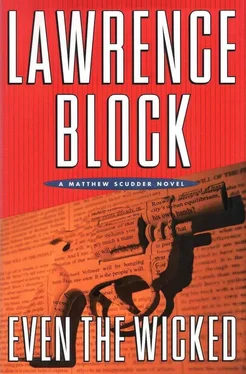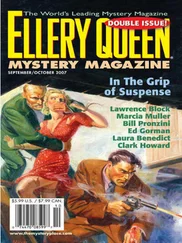Too much money . That struck me as the ultimate irrelevance, because Will looked to be a pure idealist, however misguided. It was frustrating — I’d managed to remember who it was I’d dreamed about, and I’d ferreted out the message the dream had for me, and it didn’t mean anything.
Well, why should it? A friend of Elaine’s had attended a séance, in the course of which a dead uncle of hers had counseled her to buy a particular over-the-counter computer stock. She’d risked a couple of thousand dollars, whereupon the stock plummeted.
Elaine had not been surprised. “I’m not saying it wasn’t her Uncle Manny that spoke to her,” she said, “but when he was alive nobody ever called him the Wizard of Wall Street. He was a furrier, so why should he suddenly be a financial genius now that he’s dead? Where is it written that death raises your IQ?”
Same goes for dreaming. Just because the subconscious mind sends a cryptic message doesn’t mean it knows what it’s talking about.
Too much money. Maybe Glenn Holtzmann was talking to me, maybe he thought I should spread the wealth around. Well, a word to the wise and all that. I paid for my coffee, and left the waiter twice as much as usual. Matt Scudder, last of the big spenders.
After dinner that night I watched a little television with Elaine. There were a couple of cop shows on back to back, and I kept finding fault with their investigative procedure. Elaine had to remind me that it was only TV.
After the news at eleven I stood up and stretched. “I think I’ll go out for a while,” I said.
“Give Mick my love.”
“How do you know I’m not going to the midnight meeting?”
“How do you know you won’t run into him there?”
“Do Jewish girls always answer a question with a question?”
“Is there something wrong with that?”
I walked south and west to Grogan’s Open House, a Hell’s Kitchen bar stubbornly holding its own in the face of neighborhood gentrification. Now and then a salesman will walk in and ask to speak to Grogan, which is a little like asking for Mr. Stone at the Blarney Stone. “There’s no such person,” I heard the day barman tell one such visitor. “And for all that, he’s not in at the moment.”
Grogan’s is the home turf of one Michael Ballou, although you won’t find his name on the license or the deed. His criminal record would preclude his owning premises where liquor is sold, but Mick has extended the principle of nonownership to all areas of his life. Another man’s name appears on the ownership papers for his car, and the deed to his farm in Sullivan County. What a man takes care not to own, I have heard him say, they cannot take away from him.
We met some years ago when I walked into Grogan’s and asked him some questions, feeling a little like Daniel in the lion’s den. That was the start of our unlikely friendship, and it has broadened and deepened over time. We are two men of very different backgrounds leading vastly different lives, and I have ceased to grope for an explanation of the satisfaction we find in each other’s company. He is a killer and a career criminal, and he is my friend, and you can make what you will of that. I don’t know what to make of it myself.
Sometimes we make a long night of it, sitting up past closing with the door locked and all but one of the lights out, sharing stories and silences until dawn. Sometimes he’ll finish up at the early mass at St. Bernard’s on West Fourteenth Street, the Butchers’ Mass, where he’ll wear his late father’s stained white apron and match the meat cutters who come there before they start work in the market down the street. Now and then I’ve stayed the course and gone with him, kneeling when they kneel, rising when they rise.
Male bonding, I guess they call it. Guy stuff, according to Elaine.
This was an early night, and I was out of there and on my way home well before closing. I don’t remember too much of what we talked about, but it seems to me the conversation rambled all over the place. I know we talked about dreams, and he recalled a dream that had saved his life, alerting him to a danger of which he’d been unaware.
I said I supposed a dream was when you knew something on an unconscious level, and it came bubbling up to your consciousness. Sometimes it was that, he agreed, and sometimes it was one of God’s angels whispering in your ear. I was not certain whether he was speaking metaphorically. He is a singular mix of brutal practicality and Celtic mysticism. His mother once told him he had the second sight, and he accordingly places more faith in feelings and hunches than you might expect.
I must have told him how I’d found myself standing in front of Armstrong’s, because he talked some about the owner of the Falling Rock, and who’d killed him and why. We talked about other neighborhood homicides over the years, most of them old cases, with the killers themselves long since gone to the same hell or heaven as their victims. Mick remembered a whole string of men killed for no real reason at all, because someone was drunk and took a remark the wrong way.
“I wonder,” he said, “if your man’s grown to like the work.”
“My man?”
“Himself, that’s killing men and writing letters to the newspaper about it. The People’s Will, and do you suppose William’s his true name?”
“No idea.”
“That might add to the fun,” he said, “or not, as the case may be. He’s full of himself, isn’t he? Killing and claiming credit like a fucking terrorist.”
“It’s like that,” I said. “Like terrorism.”
“They all start with a cause,” he said, “and it’s noble or it’s not, and along the way it fades and grows dim. For they fall in love with what they’re doing, and why they’re after doing it scarcely matters.” He looked off into the distance. “It’s a terrible thing,” he said, “when a man develops a taste for killing.”
“You have a taste for it.”
“I have found joy in it,” he allowed. “It’s like drink, you know. It stirs the blood and quickens the heart. Before you know it you’re dancing.”
“That’s an interesting way to put it.”
“I have schooled myself,” he said deliberately, “not to take life without good reason.”
“Will has his reasons.”
“He had them at the start. By now he may be caught up in the dance.”
“He says he’s through.”
“Does he.”
“You don’t believe him?”
He thought about it. “I can’t say,” he said at length, “for not knowing him, or what drives him.”
“Maybe he’s worked his way to the end of his list.”
“Or he’s tired of the game. The work takes its toll. But if he’s got a taste for it...”
“He may not be able to quit.”
“Ah,” he said. “We’ll see, won’t we?”
I spent the rest of the week and most of the next one just getting through the days and enjoying the fall season. One offer of work came in, a negligence lawyer who needed someone to chase down witnesses to an accident, but I passed on it, pleading a heavy caseload. I didn’t have a heavy caseload, I didn’t have any kind of a caseload at all, and for the time being I wanted to keep it that way.
I read the paper every morning and went to a noon meeting every day, and an evening meeting too, more often than not. My attendance at AA wanes and waxes with the tides in my life. I go less often when I’m busier with other things, and seem to add meetings automatically in response to the prompting of stress, which I may or may not consciously feel.
Something evidently had me wanting to go to more meetings, and I didn’t argue with it. The thought did come to me that I’d been sober for too many years to need so many meetings, and I told the thought to go to hell. The fucking disease almost killed me, and the last thing I ever want to do is give it another chance.
Читать дальше












